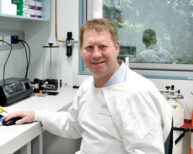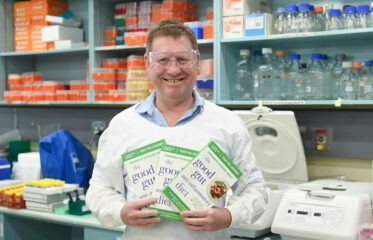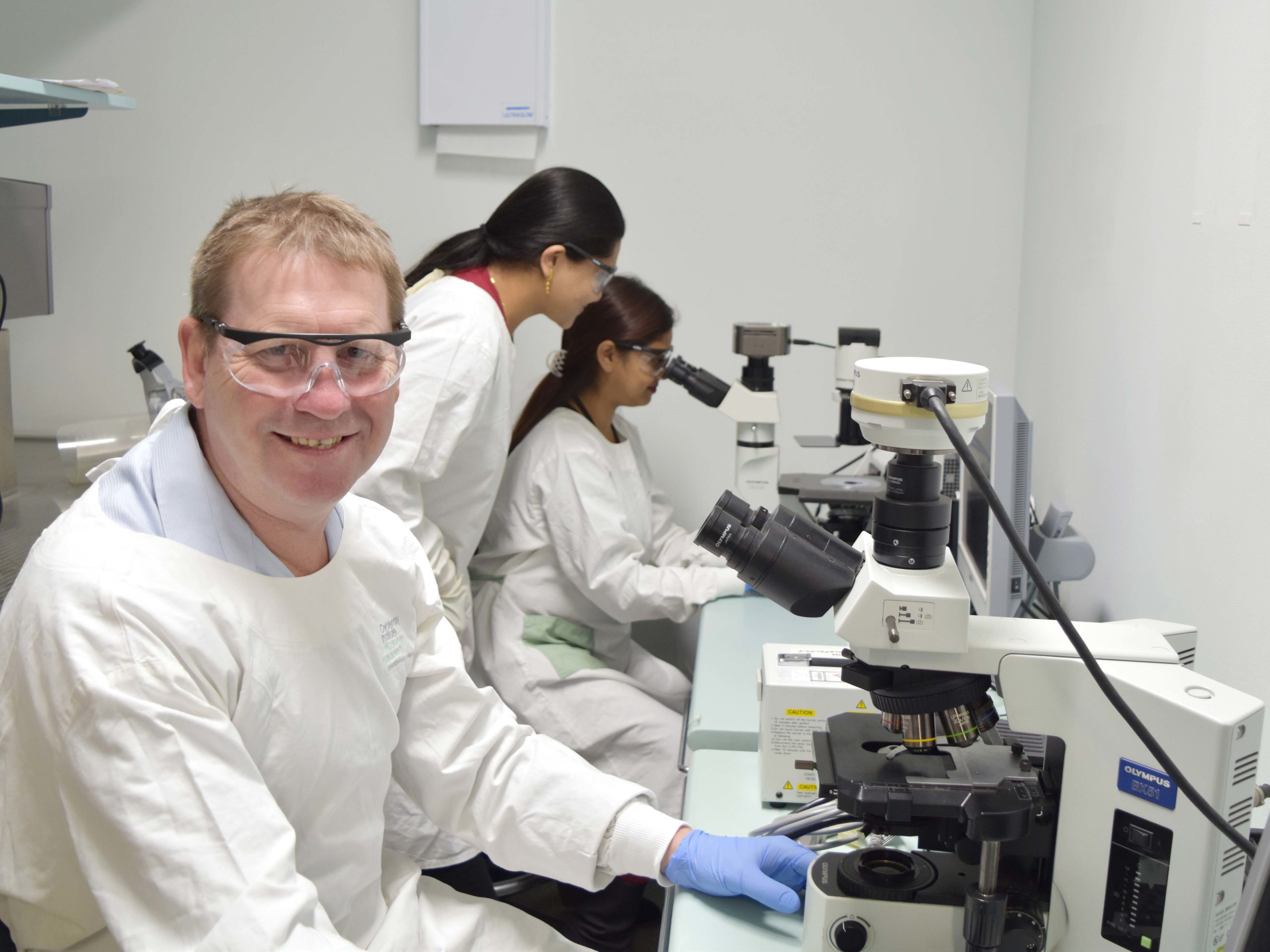Centenary UTS Centre for Inflammation

The Centenary UTS Centre for Inflammation (CFI) is Australia’s first research centre dedicated exclusively to studying the mechanisms underlying inflammation, to understand how specific diseases develop and progress and can be treated.
The Centenary UTS Centre for Inflammation brings together world-leading experts in a partnership between one of Australia’s foremost medical research institutes and the country’s top-rated young university. The Centre collaborates with a global network of other pioneering inflammation researchers, including at the universities of Manchester, Edinburgh and London in the United Kingdom, as well as other research institutes and universities (IMB/UQ, Hudson MRI, WEHI) and industry across Australia and globally.
We consider that understanding inflammation is the key to unlocking a new armoury of treatments and cures for many of the deadliest and prominent diseases effecting humanity. The Centre is at the forefront of this life-saving medical research.
An advanced approach
The first step is to develop detailed and accurate models of specific diseases, to enable us to identify new therapeutic targets. Traditionally, most research centres tend to specialise in just one or two specific aspects of a disease. In contrast, at the Centenary UTS Centre for Inflammation, we are utilising the very latest research technologies to simultaneously consider every aspect of pathways linked to the development and progression of a disease, at genetic, epigenetic, molecular, cellular and tissue levels. Data comes from advanced research techniques including single cell and spatial sequencing, RNA transcription, proteomics and mass cytometry.
Our bioinformatics specialists then use the wealth of new data generated in comprehensive ‘multi-omics’ approaches to profile the whole disease, identifying new potential targets that control entire disease pathways for therapies that might not otherwise be apparent. Using these methods to create ultra high-resolution new profiles of disease will revolutionise our understanding of how diseases develop, operate and progress over time. This is leading to revolutionary new approaches to prevention, treatments and cures.
One process, many diseases
Since inflammation is implicated in so many diseases, we believe that breakthroughs in our understanding of how to control the process more effectively in turn lead to treatments that are effective across multiple diseases. For example, Centenary developed a drug, CD5-2, that was initially designed to combat the development of solid cancers by reducing and repairing damage caused by inflammation in blood vessels. CD5-2 has subsequently been found to have potential as a treatment to prevent sight loss in people with diabetes, and to reduce damage caused by a serious brain disease, cerebral cavernous malformation, which can lead to seizures, paralysis, sight and hearing loss, and sometimes fatal stroke and brain haemorrhages.
Initial focus: respiratory diseases
Respiratory diseases driven by inflammation are among the leading causes of all deaths worldwide. More than one billion people suffer from either acute or chronic respiratory conditions. Chronic obstructive pulmonary disease (COPD), lower respiratory infections and lung cancer are three of the ten leading causes of death globally. One in 10 Australians have asthma, and pulmonary fibrosis is rare but rapidly fatal. Currently SARS-CoV-2 is causing a huge global COVID-19 pandemic infecting and killing millions of people.
Professor Phil Hansbro, one of the world’s leading respiratory researchers, leads the recently established Centenary UTS Centre for Inflammation. He and his team have over 20 years of experience in exploring how the immune system, and in particular the inflammatory process, contribute to progression of chronic respiratory diseases.
Professor Hansbro and his team are focussing on COPD, severe asthma, influenza, COVID-19, pulmonary fibrosis and lung cancer. In these diseases chronic or excessive inflammation results in tissue damage and current therapies are ineffective. As the Centre is expanding, activity in other disease areas are also being intensively investigated, including cystic fibrosis, Mycobacteria and other infections and non-respiratory diseases (eg. gut, cardiovascular, brain, kidney, liver).
Delivering for our community
The work of the Centre is transforming our understanding of how respiratory and other diseases occur, providing new targets for investigation and offering exciting new possibilities for treatments and cures that will positively impact many people’s lives. By understanding the role of inflammation and the immune system in respiratory diseases we will be closer to unlocking the drivers of other disease areas too, where inflammation also plays a leading or significant role.
Australian
Anzac Research Institute
Australian National University
Garvan Institute of Medical Research
Griffith University
Hudson Institute of Medical Research
Hunter Medical Research Institute
John Curtin School of Medical Research
John Hunter Children’s Hospital
John Hunter Hospital
Launceston General Hospital
Monash University
NSW Department of Primary Industries
Olivia Newton John Cancer Research Institute
Pharmaxis
Prince Charles Hospital
QIMR Berghofer Medical Research Institute
Royal Hobart Hospital
Royal Prince Alfred Hospital
St Vincents Hospital Sydney
Telethon Kids Institute
University of Melbourne
University of New South Wales
University of Newcastle
University of Queensland
University of Sydney
University of Tasmania
University of Technology Sydney
University of Western Australia
Walter and Eliza Hall Institute of Medical Research
Woolcock Institute of Medical Research
International
Amity University, India
Birla Institute of Technology Science Pilani Bits Pilani, India
Ghent University, Belgium
Helmholtz Association, Germany
Hospital Clinic De Barcelona, Spain
Imperial College London, UK
Indian Institute Management Ahmedabad (IIMA), India
Indian Institute of Science IISC Bangalore, India
Institut Pasteur Paris, France
International Medical University, Malaysia
Jaipur National University, India
King’s College London, UK
Lovely Professional University, India
McMaster University, Canada
Michigan Center for Integrative Research in Critical Care, USA
MRC Laboratory of Molecular Biology, UK
Nanyang Technological University, Singapore
National Institutes of Health (NIH), USA
National University of Singapore, Singapore
Pontificia Universidad Catolica De Chile, Chile
Sichuan University, China
Stanford University, USA
Trinity College Dublin, Ireland
Ulster University, UK
Universidade De Sao Paulo, Brazil
Universidade Federal de Minas Gerais, Brazil
Universiti Putra, Malaysia
University College Dublin, Ireland
University of Birmingham, UK
University of British Columbia, Canada
University of Exeter, UK
University of Ferrara, Italy
University of Glasgow, UK
University of Groningen, Netherlands
University of Manchester, UK
University of Messina, Italy
University of Michigan, USA
University of Oxford, UK
University of Salerno, Italy
Initial focus: respiratory diseases
Respiratory diseases driven by inflammation are among the leading causes of all deaths worldwide. More than one billion people suffer from either acute or chronic respiratory conditions. Chronic obstructive pulmonary disease (COPD), lower respiratory infections and lung cancer are three of the ten leading causes of death globally. One in 10 Australians have asthma, and pulmonary fibrosis is rare but rapidly fatal. Currently SARS-CoV-2 is causing a huge global COVID-19 pandemic infecting and killing millions of people.
Professor Phil Hansbro, one of the world’s leading respiratory researchers, leads the recently established Centenary UTS Centre for Inflammation. He and his team have over 20 years of experience in exploring how the immune system, and in particular the inflammatory process, contribute to progression of chronic respiratory diseases.
Professor Hansbro and his team are focussing on COPD, severe asthma, influenza, COVID-19, pulmonary fibrosis and lung cancer. In these diseases chronic or excessive inflammation results in tissue damage and current therapies are ineffective. As the Centre is expanding, activity in other disease areas are also being intensively investigated, including cystic fibrosis, Mycobacteria and other infections and non-respiratory diseases (eg. gut, cardiovascular, brain, kidney, liver).
Delivering for our community
The work of the Centre is transforming our understanding of how respiratory and other diseases occur, providing new targets for investigation and offering exciting new possibilities for treatments and cures that will positively impact many people’s lives. By understanding the role of inflammation and the immune system in respiratory diseases we will be closer to unlocking the drivers of other disease areas too, where inflammation also plays a leading or significant role.
Australian
Anzac Research Institute
Australian National University
Garvan Institute of Medical Research
Griffith University
Hudson Institute of Medical Research
Hunter Medical Research Institute
John Curtin School of Medical Research
John Hunter Children’s Hospital
John Hunter Hospital
Launceston General Hospital
Monash University
NSW Department of Primary Industries
Olivia Newton John Cancer Research Institute
Pharmaxis
Prince Charles Hospital
QIMR Berghofer Medical Research Institute
Royal Hobart Hospital
Royal Prince Alfred Hospital
St Vincents Hospital Sydney
Telethon Kids Institute
University of Melbourne
University of New South Wales
University of Newcastle
University of Queensland
University of Sydney
University of Tasmania
University of Technology Sydney
University of Western Australia
Walter and Eliza Hall Institute of Medical Research
Woolcock Institute of Medical Research
International
Amity University, India
Birla Institute of Technology Science Pilani Bits Pilani, India
Ghent University, Belgium
Helmholtz Association, Germany
Hospital Clinic De Barcelona, Spain
Imperial College London, UK
Indian Institute Management Ahmedabad (IIMA), India
Indian Institute of Science IISC Bangalore, India
Institut Pasteur Paris, France
International Medical University, Malaysia
Jaipur National University, India
King’s College London, UK
Lovely Professional University, India
McMaster University, Canada
Michigan Center for Integrative Research in Critical Care, USA
MRC Laboratory of Molecular Biology, UK
Nanyang Technological University, Singapore
National Institutes of Health (NIH), USA
National University of Singapore, Singapore
Pontificia Universidad Catolica De Chile, Chile
Sichuan University, China
Stanford University, USA
Trinity College Dublin, Ireland
Ulster University, UK
Universidade De Sao Paulo, Brazil
Universidade Federal de Minas Gerais, Brazil
Universiti Putra, Malaysia
University College Dublin, Ireland
University of Birmingham, UK
University of British Columbia, Canada
University of Exeter, UK
University of Ferrara, Italy
University of Glasgow, UK
University of Groningen, Netherlands
University of Manchester, UK
University of Messina, Italy
University of Michigan, USA
University of Oxford, UK
University of Salerno, Italy












